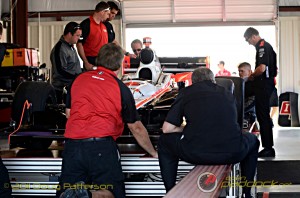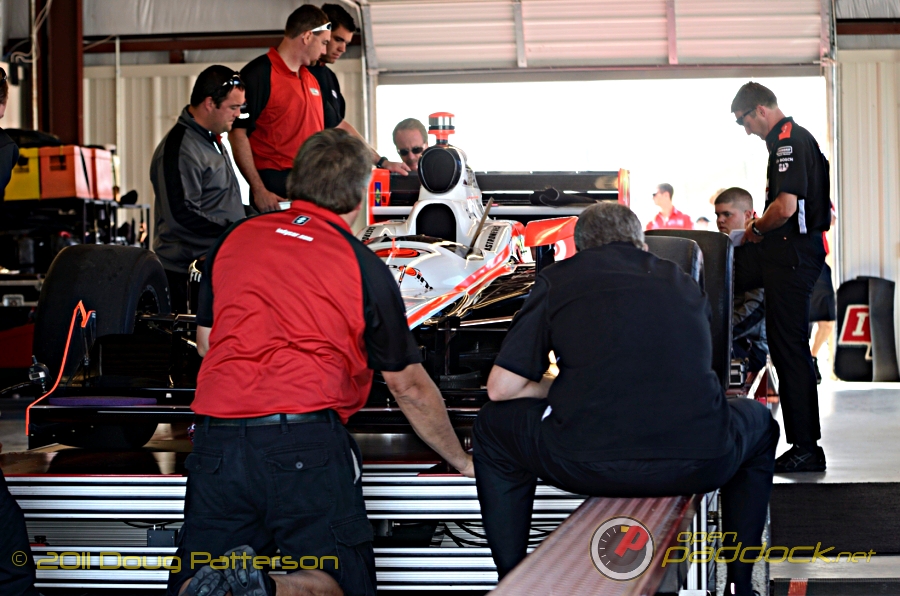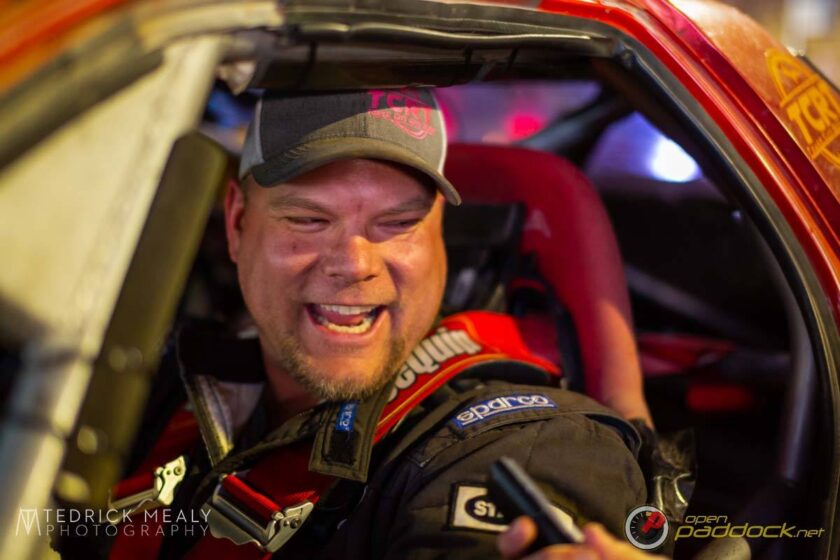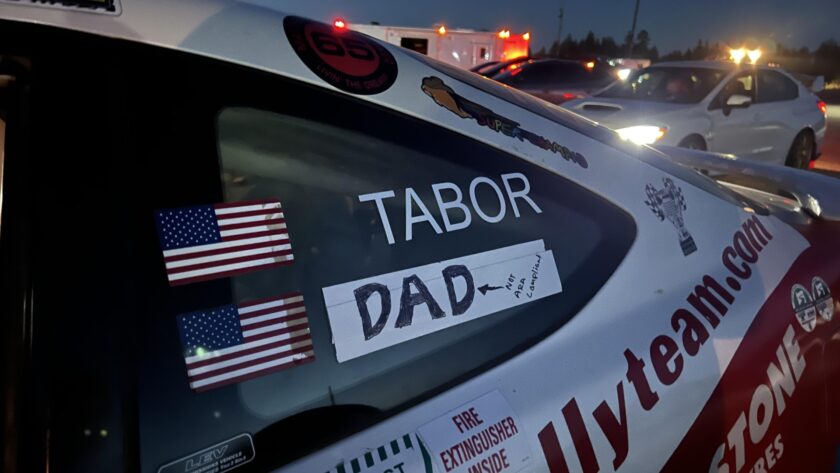The Milwaukee weekend was not a good one for INDYCAR Race Control and the technical inspection process, both of which are shrouded in a cloak of secrecy. The long-standing policy of non-disclosure when it comes to rules infractions and assessed penalties has created an atmosphere of suspicion and mistrust within the Firestone Indy Lights paddock and among the fan-base as well. The lack of disclosure and shrinking technical personnel roster has lead to inconsistencies, misinterpretations, and misunderstandings. While there’s still very little genuine information directly from the league, here are the rumors that have been flying around. First, there were 26 infractions last year, many involving podium finishing entries. Second, this year there have been 11 infractions in four races including at the Firestone Freedom 100. Third, Sam Schmidt Motorsport and Team Moore Racing have been actively exploiting the lax environment, some say with the leagues blessing. So what’s the real truth? Well, that’s just it, we’re not exactly sure what the truth is. Because of that, I’m not going to go into a finger-pointing session to say this team did that, or those guys are cheaters. There simply isn’t enough clear data. One thing that CAN be said with certainty is that the camber issue at Milwaukee is a total red herring. The announcement that Sam Schmidt Motorsports had failed post-qualifying tech is one of those miscommunication/misinterpretation issues I mentioned earlier. There are recommendations from Firestone regarding pressures, camber, toe, and the like to provide optimal tire wear. A team isn’t obligated to abide by Firestone’s recommendations, although they will be taking a risk. The announcement and subsequent owners meeting was a catalyst the firestorm that erupted on Sunday.
 So in an environment where information is scarce, what do people do? Why they use their imaginations, of course, and what wild and paranoid imaginations we have. First and foremost, there is a feeling that the Firestone Indy Lights Series doesn’t provide a level playing field and that has chased off O2 Racing Technology’s sponsors Pulse and Cell Safety, thus effectively shutting that team down. There’s also been other teams that have shared feelings that things are stacked against them in favour of the feel-good story that is Sam Schmidt Motorsports. Rather than placing blame on the teams that have apparently benefited from the current environment, I will instead pitch the blame at the culture of secrecy that has lead to this situation. In order for the league to move forward, and for the Firestone Indy Lights series to regain some stability and health, the reports from the tech line must be posted publicly for all to see. Penalties for infractions also need to be posted publicly, and done with absolute consistency. In the IZOD IndyCar Series, we’re seeing similar issues as this past weekend in Milwaukee Takuma Sato struck a tire in pit lane. That’s a violation, and he received a drive-through penalty for it. Fair enough. Dario Frachitti struck a tire in pit lane, and he received a no-harm/no-foul call. The reason for the difference? Intent and “affect on competition” as sited by Brian Barnhart. This is the type of appearance of inconsistency that leads to accusations of favouritism.
So in an environment where information is scarce, what do people do? Why they use their imaginations, of course, and what wild and paranoid imaginations we have. First and foremost, there is a feeling that the Firestone Indy Lights Series doesn’t provide a level playing field and that has chased off O2 Racing Technology’s sponsors Pulse and Cell Safety, thus effectively shutting that team down. There’s also been other teams that have shared feelings that things are stacked against them in favour of the feel-good story that is Sam Schmidt Motorsports. Rather than placing blame on the teams that have apparently benefited from the current environment, I will instead pitch the blame at the culture of secrecy that has lead to this situation. In order for the league to move forward, and for the Firestone Indy Lights series to regain some stability and health, the reports from the tech line must be posted publicly for all to see. Penalties for infractions also need to be posted publicly, and done with absolute consistency. In the IZOD IndyCar Series, we’re seeing similar issues as this past weekend in Milwaukee Takuma Sato struck a tire in pit lane. That’s a violation, and he received a drive-through penalty for it. Fair enough. Dario Frachitti struck a tire in pit lane, and he received a no-harm/no-foul call. The reason for the difference? Intent and “affect on competition” as sited by Brian Barnhart. This is the type of appearance of inconsistency that leads to accusations of favouritism.
 I had the pleasure of sitting down with Will Phillips, Vice President of Technology for INDYCAR. Mr. Phillips was hired by the league in March of this year primarily to oversee the technical aspects of the 2012 car. He also had been charged with re-evaluating the scrutineering and reporting methods for the Firestone Indy Lights and for the IZOD IndyCar Series. The changes, however, were intended to be implemented for the 2012 season. The team owners in Firestone Indy Lights Series have demanded more immediate action, most vociferously at a owners’ meeting in Milwaukee. This week, the league has made some initial movements toward transparency, making all technical violation and penalty assessment reports available to the teams. Full public disclosure is still a ways off, but its a start.
I had the pleasure of sitting down with Will Phillips, Vice President of Technology for INDYCAR. Mr. Phillips was hired by the league in March of this year primarily to oversee the technical aspects of the 2012 car. He also had been charged with re-evaluating the scrutineering and reporting methods for the Firestone Indy Lights and for the IZOD IndyCar Series. The changes, however, were intended to be implemented for the 2012 season. The team owners in Firestone Indy Lights Series have demanded more immediate action, most vociferously at a owners’ meeting in Milwaukee. This week, the league has made some initial movements toward transparency, making all technical violation and penalty assessment reports available to the teams. Full public disclosure is still a ways off, but its a start.
When asked about the Firestone Freedom 100 issues, Mr. Phillips stated that it was a problem of the inspection process and methods by which samples were handled and tracked that was inadequate, and those methods are among the highest priority issues to be addressed and fixed. The mishandling of samples from the Sam Schmidt Motorsports cars created a situation in which the league could not have backed up any claim of a violation. While us fans, the sponsors, and the teams all want things to change immediately, its not going to happen. Upon reflection, its perhaps not a bad thing as changes made in haste can often have unintended consequences. It won’t make all of the teams and fans happy, but incremental changes is perhaps the best way to proceed so long as the league does keep up with the evaluation of each new change and re-evaluation of everything that’s been done before. The biggest problem after the league fixes the methods and reporting process for scrutineering is fixing the perception. Mr. Phillips claimed that was an issue for marketing and PR, and that his staff are consistent in their measurements and assessments. Changing the minds of others that rulings are consistent is a different matter, and a much harder task.
Is the league on the right track? Will these incremental changes be enough to assuage the Firestone Indy Lights teams and sponsors, or is it too little too late? We’ll see, but at least it seems that the league has heard the team and fans and is actively working toward a more transparent and rigorous method of tech inspection.





If Randy is doing his due diligence, he’ll see this as yet another example of corruption on the part of Brian Barnhart’s whole organization, from IndyCar on down. There IS favoritism, based on money that a team brings to the series or not. It must be rooted out, or this situation will just keep continuing. We’re a SPORT, people…not a WWE event.
I have to agree with you, Squall, regarding TGBB and Race Control, but Mr. Phillips is a new hire, and I think we will start to see some positive changes in how tech is done and reported. Its still a question as to how the stewards choose to apply and enforce penalties based on tech inspections, though. IMHO, a simple fine is insufficient. We need to be looking at grid spot and championship points.